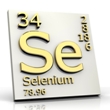Most people probably don’t think much about their trace mineral status. We only need tiny amounts of these micronutrients, so aren’t we getting enough from our diet? Maybe not. There is one trace mineral you should be paying attention to if you have thyroid problems, especially autoimmune thyroiditis, such as Hashimoto’s. It’s selenium.
Selenium concentration is higher in the thyroid gland than in any other organ in the body, and, like iodine, selenium has super-important functions in thyroid hormone production and balance throughout the body. Selenium-dependent enzymes are needed to convert T4, the inactive form of thyroid hormone, to T3, the active form. Selenium is also involved in the feedback pathways that balance different forms of thyroid hormones. It is integral to the production of glutathione peroxidase, an important anti-inflammatory biochemical that works throughout the body, and is especially protective of thyroid cells.
Clinical research shows that low selenium levels in the blood are associated with higher risk for thyroid enlargement and damage in people with mild iodine deficiency. In patients with Hashimoto’s disease and in pregnant women with auto-immune (anti-TPO antibodies), selenium supplementation decreases anti-thyroid antibody levels and improves the ultrasound structure of the thyroid gland. Pregnant women given supplemental selenium significantly decreased their risk for thyroid problems after pregnancy. In Graves’ disease, selenium supplementation speeds recovery and reduces the risk for the vision-threatening bulging eyeballs that is the classic trademark of this disorder.
About 200 micrograms a day of selenium seems to be needed to be effective for thyroid protection. That’s is about four times the RDA and about half of what most women are thought to get daily from food. For people who have established thyroiditis, I find that a higher dose, 400 micrograms, is a useful dosage.
You can get selenium from your diet, with some care. No other food beats Brazil nuts for selenium, but other decent sources are crimini mushrooms, cod, shrimp, tuna, halibut, salmon, scallops, chicken, eggs, shiitake mushrooms, lamb and turkey.
People who require higher doses to prevent or treat thyroid problems will need to take supplements. The most absorbable forms are selenomethionine or selenocysteine. Least absorbable is sodium selenite or sodium selenate. The human body absorbs more than 90% of selenomethionine but only about 50% of selenium from selenite.
REFERENCES
Balaz C, Feher J. The effect of selenium therapy on autoimmune thyroiditis. Clinical and Experimental Medical Journal 2009;3:269-77
Drutel A, Archambeaud F, Caron P. Selenium and the thyroid gland: more good news for clinicians. Clin Endocrinol (Oxf). 2013 Feb;78(2):155-64.
Duntas LH, Mantzou E, Koutras DA. Effects of a six month treatment with selenomethionine in patients with autoimmune thyroiditis. Eur J Endocrinol. 2003 Apr;148(4):389-93.
Gärtner R, Gasnier BC, Dietrich JW, et al. Selenium supplementation in patients with autoimmune thyroiditis decreases thyroid peroxidase antibodies concentrations. J Clin Endocrinol Metab. 2002 Apr;87(4):1687-91.
Gärtner R, Gasnier BC. Selenium in the treatment of autoimmune thyroiditis. Biofactors. 2003;19(3-4):165-70.
Mazokopakis EE, Papadakis JA, Papadomanolaki MG, et al. Effects of 12 months treatment with L-selenomethionine on serum anti-TPO Levels in Patients with Hashimoto’s thyroiditis. Thyroid. 2007 Jul;17(7):609-12.
Schomburg L. Selenium, selenoproteins and the thyroid gland: interactions in health and disease. Nat Rev Endocrinol. 2011 Oct 18;8(3):160-71.
Schrauzer GN. Nutritional selenium supplements: product types, quality, and safety. J Am Coll Nutr 2001;20:1-4.
Toulis KA, Anastasilakis AD, Tzellos TG, et al. Selenium supplementation in the treatment of Hashimoto’s thyroiditis: A systematic review and a meta-analysis. Thyroid 2010;20:1163-73.
Turker O, Kumanlioglu K, Karapolat I, et. al. Selenium treatment in autoimmune thyroiditis: 9-month follow-up with variable doses. J Endocrinol. 2006 Jul;190(1):151-6.
Zagrodzki P, Ratajczak R. Selenium supplementation in autoimmune thyroiditis female patient–effects on thyroid and ovarian functions (case study). Biol Trace Elem Res. 2008;126:76–82.


I eat Brazil nuts every day. How many nuts do you need to get 400 micrograms?